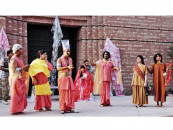Trying honour killing at ATCs
A cultural reality, honour-killing is not a rarity in Pakistan

A cultural reality, honour-killing is not a rarity in Pakistan. According to the UN, each year, over 1,000 women are killed in the name of honour in the country. Farzana’s case was at the forefront of all media reports and was followed with vigour. However, there are hundreds of such cases which go unreported. Although justice can never be fully served for such a brutal offence, Farzana’s killers were sentenced to death by an Anti-Terrorism Court (ATC) on November 19, after almost six months of legal proceedings.
Had Farzana’s case been heard in an ordinary court as opposed to an anti-terrorism court, there is a possibility that her killers would have taken advantage of the law that allows the payment of money to the victim’s relatives to compensate for any murder committed, and hence, escape being sentenced. But how can such a compromise be agreed upon for barbaric acts? How can any amount of money be compensation for a lost life?
Luckily, Farzana’s case was heard in an ATC. Under the laws of the ATC, such compensation cannot be paid for the settlement of a murder case and the assailant is handed a sentence regardless of whether the victim’s family is willing to accept compensation or not. So, why is it that all murder cases are not heard in an ATC? There is currently no legislation in Pakistan that required all murder cases to be heard in an ATC. There has to be a change in our legal system that can ensure that murderers like those of Farzana, who invoke ‘honour’ while committing a heinous crime, receive their rightful punishment. By no means am I condoning the death penalty, but the settlement of an honour killing case in monetary terms is something that is beyond my comprehension.
Published in The Express Tribune, December 6th, 2014.



















COMMENTS
Comments are moderated and generally will be posted if they are on-topic and not abusive.
For more information, please see our Comments FAQ